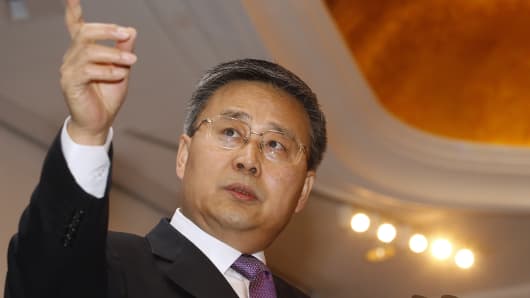How close is China to driving financial reform and opening up its markets? Perhaps the answer lies not with the country's new leaders, who are being watched closely for their willingness to bring reforms, but with Beijing technocrats who appear to be pushing ahead with change.
Guo Shuqing, the chairman of the China Securities Regulatory Commission, caused much excitement last week when he suggested that this year could bring sweeping new measures to open up financial markets in the world's second biggest economy.
Foreign investors hold about 1.5 percent of the local share market's value and China could increase this by "10 times," Guo said in comments that sparked a 3 percent jump in the Shanghai stock index.
"We are seeing a real transformation of China opening up its capital account, which means that investment dollars should be able to flow freely into China and out of China," Aaron Boesky, CEO at Marco Polo Pure Asset Management told CNBC. "The most glaring and prominent announcement that's been made in the last few months regarding the capital account was the comment from Guo Shuqing."
Last year, Guo led a move that more than doubled the amount of Chinese shares foreign investors could own, lifting the quota for qualified foreign institutional investors (QFII) to $80 billion from $30 billion.
"People say the (latest) remarks are too aggressive. If you look at prior to 2012, the amount of the QFII quota ranged by $1.5 to $2 billion a year, for 2012 it was $15 billion, so that was a rise of ten times. So for us it would be dangerous to ignore these comments," said Peter Alexander, managing director at China investment advisory Z-Ben in Shanghai.
"What is critical is the direction, how quickly will it be rolled out. From a broader perspective, we think what is happening right now, not just with QFII, is significant and we think a lot more (measures) will be coming out and they relate to the opening up of the renminbi," he added, referring to the Chinese currency.
(Read More: Yuan as a World Currency? Getting There Fast)



